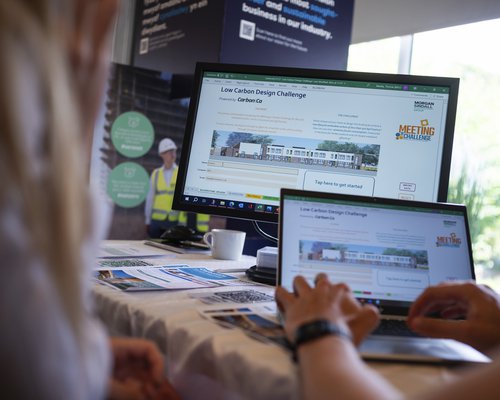Morgan Sindall Construction, alongside other partners in the construction industry, has been selected by LocatED – the specialist government-owned consultancy - and the Department for Education (DfE) to work on a new feasibly study to decarbonise education estates in England.
As part of the study, the Morgan Sindall team will undertake a series of feasibility studies which have been chosen based on criteria including potential carbon savings, capital/ROI and operational impact. Using our approach to intelligent solutions and inhouse whole life carbon tools such as CarboniCa, the team will utilise their experience to propose decarbonisation solutions for the chosen schools.
LocatED announced the start of a feasibility study for its Net Zero Accelerator programme on 9 November – a scheme that aims to facilitate the rapid rollout of decarbonisation initiatives across the education estate. Delivery partners have been selected to take part in a feasibility study that will work with 50 schools from across England to explore the commercial viability of a range of decarbonisation interventions.
Net Zero Accelerator
The concept of the Net Zero Accelerator is to create a ‘one stop shop’ to fund and deliver decarbonisation initiatives across the education estate through a new national service. This will provide responsible bodies, such as local authorities and multi-academy trusts, with a low burden service to address building condition and energy efficiency to help improve their estate including the delivery of decarbonisation interventions.
Furthermore, the programme will aim to reduce risk to responsible bodies as well as the time and resources they put into decarbonisation. This will be achieved by requiring no upfront payment; through sharing the risk of delivery with external market partners; and arranging the intervention work and funding for them.
Commissioned by the Department for Education (DfE) to create and run the programme, LocatED launched the Net Zero Accelerator in August this year with a market engagement session attracting over 270 participants. With Net Zero a key aim of the DfE’s Sustainability and Climate Change Strategy for the education system, the programme aims to help deliver this.
Commenting on the launch of the Net Zero Accelerator feasibility study, LocatED Chief Executive Lara Newman said:
We are passionate about helping the DfE and, indeed, the whole country achieve Net Zero. The education estate represents 37% of all public sector building emissions. If schools and colleges are able to reduce their carbon footprint and achieve net zero, this will go a long way to meeting the government’s goal.
However, we recognise that for individual educational bodies, figuring out the right thing to do for their estate is incredibly difficult to do alone. Deciding whether to opt for air source heat pumps and solar panels or installing an electric vehicle charging station and added insulation is not an easy choice. This is why the Net Zero Accelerator is intended to lift the burden from the educational bodies of identifying what interventions will work for their buildings and how the work will be financed.”
Alan Smedley, national framework director for Morgan Sindall Construction said:
We’re excited to be working in partnership with the Department for Education (DfE) and LocatED to support the Net Zero Accelerator programme.
In addition, we’re thrilled to be working in alliance with some of our existing industry partners to highlight many of the solutions tried and tested on our own collaborative projects that will support long-term decarbonisation in the education sector.
Feasibility Study
The feasibility study, which began on 6 November, will demonstrate the range of potential decarbonisation interventions that could be delivered as part of the Net Zero Accelerator; the associated reduction in carbon produced and energy consumed; the cost of delivery; and the income generation based on existing school data such as energy consumption, condition data, asset registers and building surveys. It will also explore how a positive return on investment (ROI) can be generated so that a commercially viable programme of work can be rolled out at pace.
Following an Invitation to Tender in September 2023, LocatED and the DfE appointed the following delivery partners for the feasibility study:
- Barker Associates in consortia with: Place Group, Ashden Climate Solutions/Let’s Go Zero, Lloyds Banking Group, Caladen Consulting Limited and Ginger Energy
- Arcadis in consortia with Cundall
- Gleeds in consortia with eEnergy and PureThermal
- Morgan Sindall Construction
- Syzygy Consulting
The studies are due to conclude by the end of the year and report by the end of February 2024. The results of the feasibility study will inform the viability of a trial roll out in Spring 2024.




